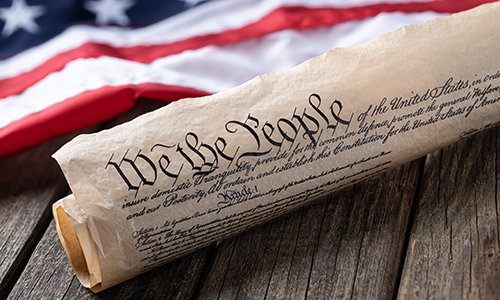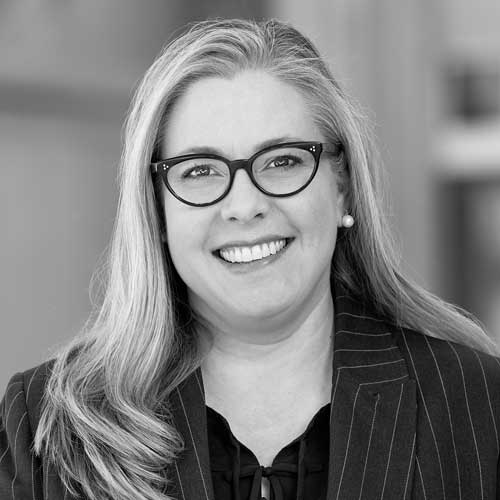Constitution Day 2024: A Call to Untiring Effort
 Over two hundred years ago, on September 17, 1787, members of the Constitutional Convention signed the United States Constitution. Each year on this day, we celebrate Constitution Day and the establishment of our government and the guarantee of our rights.
Over two hundred years ago, on September 17, 1787, members of the Constitutional Convention signed the United States Constitution. Each year on this day, we celebrate Constitution Day and the establishment of our government and the guarantee of our rights.
Over the last few months, I have had the great opportunity to attend a number of events where the Constitution and democracy were front and center. The American Bar Association’s Democracy Summit as part of the ABA meeting in Chicago, the World Justice Project’s Convening on Democracy and the Rule of Law, and the Tenth Circuit Bench and Bar Conference were all rooted in the critical role of the rule of law.
There is a clear groundswell that we must do more than just laud democracy and the rule of law. While there is great importance in speaking to the value of these American institutions, there is a great necessity to do much more to uphold them.
The justice system has long leaned on the crutch that “to know us is to love us.” This mindset leads to a singular focus on education to raise levels of public trust and confidence in our justice system. While our research has shown that increased information and public understanding of the justice system is critical, since its inception, IAALS has called for action and change to ensure a justice system that is actually working for people. It is from this critical foundation that trust and confidence in our justice system can be built.
The same crutch exists when it comes to democracy and the rule of law. We presume that with education and exposure, these concepts will be embraced and will prevail. In fact, we have a duty to continually do the hard work to strengthen our democracy and make sure that it lives up to its promise for all people.
IAALS has a unique role to play in this regard as a non-partisan, research institute that innovates and advances solutions that make our civil justice system more just. IAALS has been a leader in calling for justice system reform that is evidence-based and driven by research. Building on this research, we convene diverse perspectives with the express goal of creating an atmosphere where people are comfortable speaking openly about different viewpoints. We are living in a time when our relationship with discourse and debate is increasingly fraught. In a very divided political atmosphere, IAALS stands in the unique position of being able to convene different viewpoints in a more neutral way. In these conversations, it is important for us to create space to question the status quo and identify where our system is not always measuring up—and to reimagine what the system could be.
This is the work that must be done to advance our justice system, and it is the framework from which we can also tackle the difficult challenges in this moment to democracy and the rule of law. The American Bar Association’s Democracy Summit and the World Justice Project’s Convening on Democracy and the Rule of Law provide excellent examples of convening different perspectives and creating space for dialogue. We must constantly push beyond discussion alone, and to do that we must look to leaders in our system to help lead change.
Judges are in a unique position to serve as leaders, innovators, and catalysts for change. Judges have a front row seat to the problems and challenges while also having an opportunity to enact impactful change. For this reason, IAALS, together with the Berkeley Judicial Institute, is hosting Advancing Innovation: A National Summit on Judicial Leadership this week to bring together judicial leaders from state and federal courts across the country to explore practical strategies for driving innovation to make the legal system work better for everyone.
We cannot rest this work on judges’ shoulders alone—lawyers have an equally critical role to play. The ABA Task Force for American Democracy has shared actions that individual lawyers can take, recognizing that “lawyers and judges play a unique role in upholding the rule of law, ensuring that laws are applied equally to all citizens and that government actions are subject to judicial review, leading to accountability, transparency and predictability in governance.” These actions include speaking and community engagement, but also pro bono in support of free and fair elections and standing up for judges who are subject to unwarranted attacks and threats of violence.
Our law schools are training the next generation of lawyers and have their own role to play in teaching future leaders how to protect and preserve the rule of law and engage across political and ideological divides. A recent letter from the Deans of American Law Schools affirms this role and the need for action, referencing President John F. Kennedy's remarks on the enduring commitment needed to maintain such a system of government: “Democracy is never a final achievement. It is a call to untiring effort....”
While organizations, judges, lawyers, and law schools all must be engaged in this untiring effort, we must reach beyond our roles and institutions to engage with those outside the legal system to protect our democracy and the rule of law. Just as we advocate for diversity of perspective in formulating solutions to the challenges in our justice system, it is equally critical that discussions on democracy and the rule of law—and the work to be done—not be limited to judges and lawyers alone. As with the gap that exists between the need and the delivery of legal services, lawyers alone will not—and cannot—address the full extent of the crisis we currently face in our democracy.
In addition to my conversations with those deeply engaged in this work over the last few months, the conversations that I have had along the way with people who are not have been equally memorable. When I have shared with my Lyft drivers that I work at an organization focused on making justice for all a reality for everyone, it sparks amazing conversations about their own experiences and commitment to improve our justice system. There is a clear desire for people to share their stores and be a part of positive change, and that gives me hope. We have our work cut out for us, but I urge us all to move from discussion to action, for democracy and the rule of law is worth this untiring effort.


